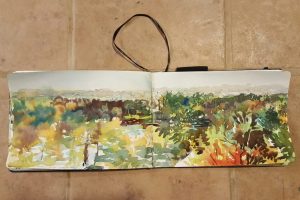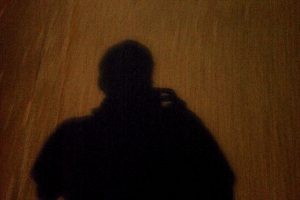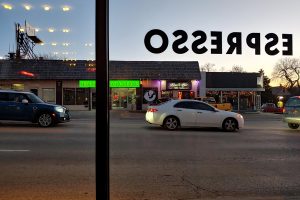
Jarrod stared at his laptop. The lines he typed an hour ago lurked on the screen, unmoved, uninspiring, uninteresting. He read the stanza from the top, hoping to jump-start his brain and add a few more lines to complete the poem. Nothing brewed in him. Instead, something else became clear. This was not a poem. Not even the beginning for one. It was a poor attempt at being smart, unique, thoughtful. He pondered whether to save it or junk it, and finally decided on the latter. The screen blinked and turned white again, the cursor blinking at the top left, challenging him to go at it again. He sighed, a little louder than was appropriate, given the circumstance.
The sound attracted some attention at the coffee shop. A woman seated at a table a few feet away from him raised her eyes from her book and glared at him admonishingly. Jarrod smiled apologetically and straightened in his chair. The laptop screen glared at him, like a teacher staring down a student tardy with his school work. He placed his hands on the keyboard as if hoping they will start typing away and do his work for him, relieving his anxiety. But to no avail. The screen remained black, as was his mind.
Frustrated, he closed his laptop and looked around. The woman at the table near him read her book and ignored him. A couple at the corner table was having a conversation over salads, but he could not hear them. The two baristas organized items behind the counter. Outside on the street, the traffic hummed its casual city theme. Jarrod deliberated whether to leave the coffee shop or stay. His coffee cup sat empty, and he had no desire to refile it. The woman with the book looked attractive. He might try to strike up a conversation with her, perhaps mention his writings. He will read her a poem or two, impress her, maybe invite her to have dinner with him. Oh, who was he kidding? He could impress no one. He was an unknown poet, one of millions just like him. Creative, hopeful, frustrated. Spending his afternoon at a coffee shop with nothing to show.
Over the years he read some of his works at different gatherings of local writers. He attended a number of regional conventions, listened to the lectures, and tried to interest some publishers in his writings. One of them, an older man who resembled Jarrod’s high school shop teacher looked at his folder, and returned it to him after a quick scan, sneering “Keep working and see me in five years.” Five years?! He has been honing his poetry for more than twelve! He thought he was a good poet. He knew he was a good writer. But sadly, he was the only one to recognize those facts.
Jarrod wanted to get noticed, to be successful, he very much wanted to do so. Get published and earn a living from his books. Be the one everyone waits for before starting a poets’ meeting, come to seek advice from, try to befriend, wish to be like. He wanted to be everything he was not. But he could not achieve that to save his life. Hack, even the woman reading next to him did not pay attention to him. She kept to her book, turning page after page, enjoying herself. The only time she noticed him was when he sighed. Well, at least that was something. The couple in the corner did not turn their heads toward him even once. What does one need to do to get noticed? What??
Get noticed, he thought. Be famous. Be known. His endless efforts at writing clever, engaging, original poetry yielded no results. Maybe he should get recognized for something else, and let his poetry rise naturally to the surface as people learn of him. He needed to perform some heroic act. Save someone in a dangerous situation. Someone’s life, just like in the movies. His heart raced, imagining him throwing himself into danger while bystanders look on. Save a person. Save the day. Be famous. Be known. Oh, come on! He was no hero. Only in his dreams. He wouldn’t offer to help an old lady to cross the street, afraid she will mistake his offer for a purse-snatching attempt and smack him with a bag, yelling for bystanders for help. He sighed again, careful to do it quietly. He was always misunderstood. His poetry. His ambitions. Everything he was. His entire life was one long saga of misunderstandings. But he was going to change that, he decided. He was going to change that today.
Jarrod looked outside, hoping to find a clue in the urban scenery. He found it quickly, standing across the street under a green and white sign. He gathered his belongings into his bag, threw his cup in the trash can by the door, and left. He crossed the street, careful with the drivers who had to negotiate his jaywalking. His intended target had a glass door that felt heavy and cool to the touch. He pushed it in and entered the lobby.
“Welcome to Merchant Savings Bank. May I help you?” the teller in the middle window motioned from him to approach.
“Just a second.” Jarrod took out his folder and opened it as if searching for some paperwork. He looked to both sides. There were no security guards visible. One would occasionally stand by the front door or somewhere in the lobby. If a robber walked in right now, no one would be there to stop them. No one but him. He will be the one, that hero, the one everyone will recognize, the one who will give interviews on TV later on. Jarrod noticed a sitting area to the right; two sofas and a table. A self-help coffee machine stood near it. He walked over and sat down, facing the front door. He reopened his folder and shuffled the papers in it.
“Good afternoon, sir,” a lady came out from the office to his left. “Is someone helping you?”
“Umm, I… I mean… not yet,” he fumbled his words. “I… I’ll be ready in a few minutes,”
“Well, let me know when you are ready, and I will be happy to help you,” she smiled and returned to her office.
Jarrod checked his watch. If a robber was not going to walk through the front door in ten minutes or so, he will have to come up with a new plan. He couldn’t just sit here the whole day and wait. Someone was bound to get suspicious and call the police. He will need to answer questions, be embarrassed, or worse. The worse part worried him. He would not be able to afford a lawyer. He would lose the small savings he had. No, he realized. Unacceptable solution. He needed to think of a different plan.
Jarrod stood up. The banker who addressed him earlier rose from her chair.
“I’m sorry, I don’t have all my papers with me,” he said before she made it out of her office. She nodded and returned to her work. Jarrod walked toward the front door. He needed to think of something.
He was about ten steps from the door when a bearded, rough-looking man walked in. The man carried a dark object in his hand and headed straight to the tellers’ window. A charge went through Jarrod’s body. This is my lucky day! He redirected his steps to intercept the man.
“Stop! Don’t move!” he yelled. The robber continued to walk as he turned his head toward the source of the noise.
“Stop!” Jarrod yelled again. The robber realized he was the target of the holler, stopped, and turned toward Jarrod.
“What is your problem?” he asked in an angry voice and looked around as if trying to assess additional danger.
“Put your hands up and get down on the floor,” Jarrod said in a stern, authoritative voice. “Now!” he said louder.
“You’d better chill before you get yourself hurt,” the robber stood in place. He was not going to obey Jarrod’s orders. Worse, he was ignoring Jarrod just like everyone else did all the time. He was disregarding Jarrod and about to rob the bank, just like that. Jarrod needed to act quickly before this robbery got away from his control.
“Is there a problem?” a man in a tan suit and blue tie featuring the bank’s logo on it approached them. The tag on his jacket read “William Hobbs, branch manager”.
The bearded man reacted first. “Hey, Bill. I came in to make my deposit and this weirdo started yelling at me,” he raised his hand to show the dark item he carried, a leather money envelope.
“And who are you, sir?” the branch manager turned to Jarrod.
“I’m… I’m,” Jarrod mumbled. “I thought he was robbing the bank.” He held tight to his folder.
“You’re damn crazy,” the bearded man dismissed him, and instantly turned his sight to the door. Everyone did the same, including Jarrod.
Two police officers walked in with their guns drawn. Blue light flashed atop a police cruiser stopped in front of the building.
“False alarm gentlemen,” the bank manager walked toward them with his hands up. “We had a simple misunderstanding here.”
“Thanks, Bill,” the first officer nodded at the bank manager and looked around. He replaced his gun in his belt. The second officer followed suit and reported something into his shoulder mic.
“So, let me get the story here,” the first officer took a step forward.
About twenty minutes later the officer finished interviewing Jarrod, the bearded man, the manager, and the lady banker. He handed Jarrod a summons for disturbing the peace with a court date for nine weeks later. Deflated, Jarrod left the bank. A TV reporter rushed to him as soon as he stepped outside.
“Were you involved in the incident earlier today?” he placed a microphone in front of Jarrod.
“Yes, yes I was,” Jarrod ran his hand through his hair.
“What were you doing at the bank?” the reporter moved closer.
“My name is Jarrod, Jarrod Sunnyvale. I am a poet. I was at the coffee shop there, across the street,” he pointed behind the reporter’s shoulder.
“I meant, what were you doing at the bank?” the reporter repeated his question.
“Like I said, I write poetry, and I was at the coffee shop, writing, and…” The officer who interviewed them exited the bank. The reporter abandoned the interview and rushed to intercept him. The cameraman lifted the video camera with its tripod and rushed after him. A red Channel 3 News logo sticker covered the right side of the camera. Jarrod looked at the small crowd watching the scene and waited for the news crew to return and continue his interview. The reporter proceeded to interview the bearded man and the bank manager. He and the cameraman returned to the news van and loaded their gear. Jarrod approached them but they ignored him and drove away. The street returned to its familiar hum. The sun rested low over the building to the west. Jarrod shuffled home slowly.
Hours later, Jarrod sat alone in his apartment. The court summons rested on the table, right next to his empty dinner plate. The 10 o’clock news came on, and he waited anxiously for his face to appear on the screen. Someone will notice, he thought. Someone is watching and is bound to recognize him. He was proud of his effort. It wasn’t the heroic act he imagined, but it was something. Not too dangerous, no one got hurt, and he got to talk to a TV reporter! He could not recall what exactly he said on camera, but he was pretty sure he mentioning his poetry. He was hopeful and eager to find out how he did. That story was sure to come up next, right after the weather report.
“And that’s the news for tonight,” the anchors returned to the screen. “Thank you for watching, and we’ll see you again starting at 5 tomorrow.” The program’s logo appeared, and a set of commercials began playing. That was it. Disappointed, Jarrod turned off the TV. There was not a single mention of his ordeal. Not a picture with his name lettered underneath. No recognition of his bravery or dedication to the written word. No chance at fame and success. He remained unknown, the same as he was before, the same he will always be. He opened his laptop and began to write.
December 3, 2014
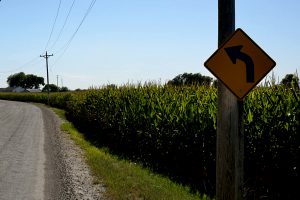
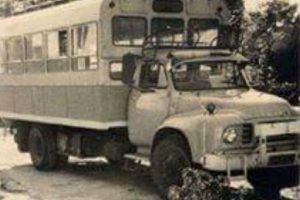
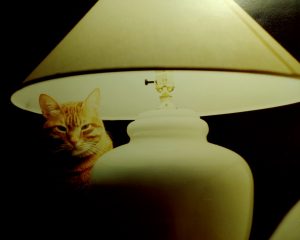 To receive the proper attention it deserves, this collection of short and funny cat stories can be found on its own page via
To receive the proper attention it deserves, this collection of short and funny cat stories can be found on its own page via 
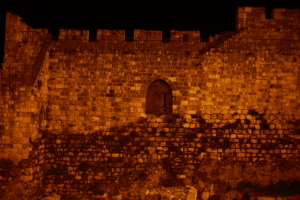 Someone shook my shoulder to wake me up. The chill sent me shivering as I awakened from an uncomfortable slumber. The ground I laid on instantly reminded me of where I was. I held my hand up and looked at my Seiko. The hands glowed dimly. 2 a.m. Time to get up.
Someone shook my shoulder to wake me up. The chill sent me shivering as I awakened from an uncomfortable slumber. The ground I laid on instantly reminded me of where I was. I held my hand up and looked at my Seiko. The hands glowed dimly. 2 a.m. Time to get up.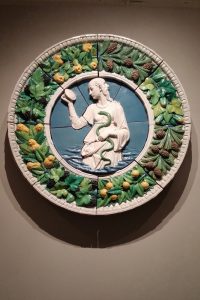
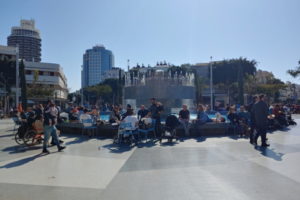 “,דִּירוֹת בְּתֵל אָבִיב הֵן כְּמוֹ גֶּבֶר שָׁוֶה”
“,דִּירוֹת בְּתֵל אָבִיב הֵן כְּמוֹ גֶּבֶר שָׁוֶה”
